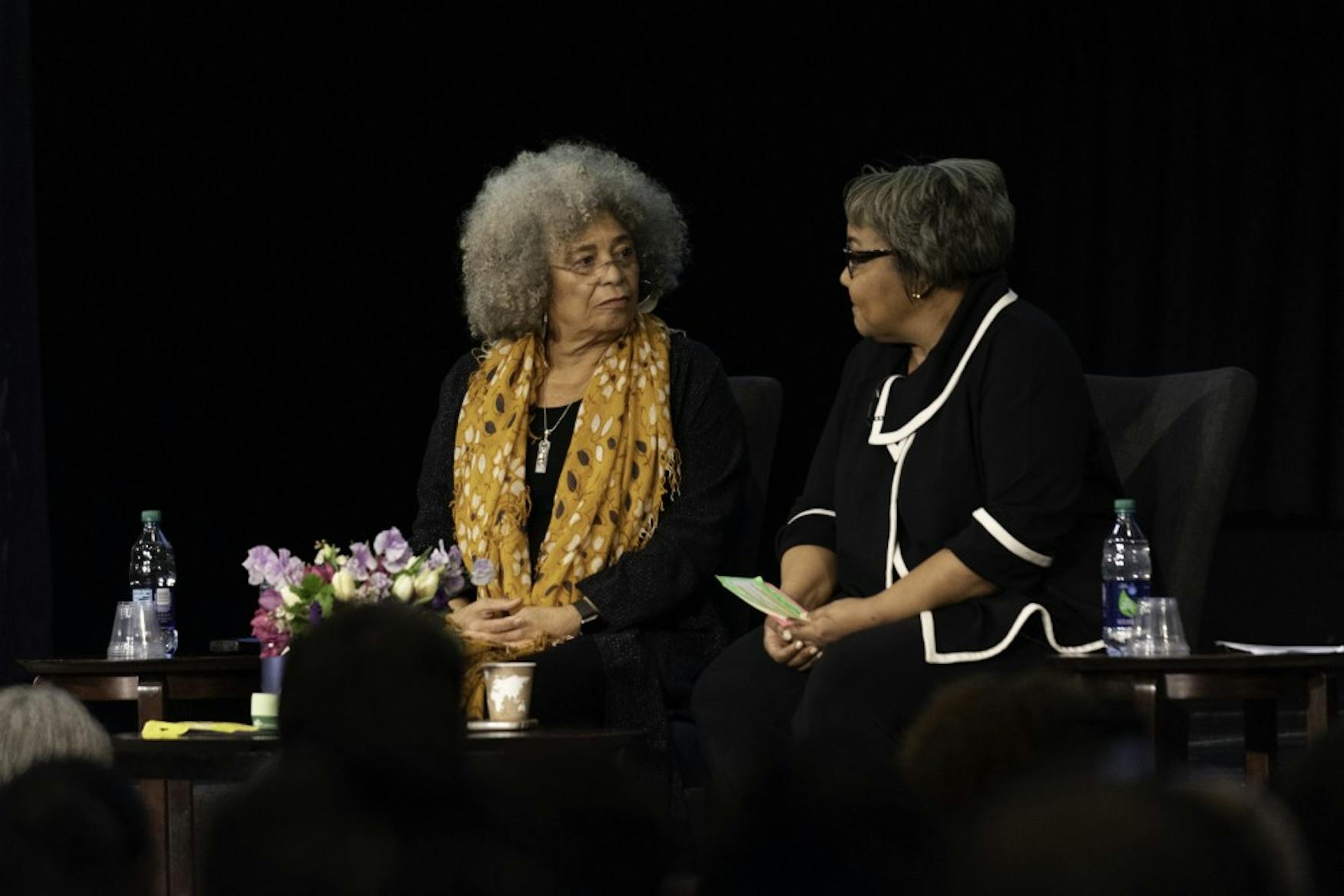At AAAS event, Angela Davis discusses her life in activism
Angela Davis ’65 spoke about her experiences as an activist and Brandeis student on Friday as the keynote speaker for an event series commemorating the African and African American Studies Department’s 50th anniversary. Julieanna Richardson ’76, H’16 introduced Davis and asked her questions throughout the program that fueled the conversation.
Davis began by describing her educational journey during her early life. At 15, she was accepted to Fisk University. Per her father’s recommendation, Davis turned down the acceptance. Instead Davis went on to finish high school while living with a white minister’s family in New York. The school she attended was founded by teachers who had been blacklisted from the public schools in the area because of their political beliefs. “It was really exciting,” Davis remembered. “I went to a high school where we read the Communist Manifesto and … Freud.”
After high school, Davis continued her education at Brandeis University, where she was one of very few Black students. At Brandeis, she dove into French language and culture, discovered a love for the humanities, and abandoned her goal of becoming a doctor. Despite enjoying the “intellectual atmosphere” at Brandeis, Davis struggled with facing a kind of oppression that she was unfamiliar with. “I made this journey from the south to the north in search of some kind of freedom, and what I thought I would find in the north wasn’t there,” she said. “I discovered new forms of racism that I could not at the time articulate as racism.”
Davis explained that her introduction to the conflict between Israel and Palestine took place during her undergraduate years. “I first learned about Palestine when I was a student here at Brandeis,” she said. “I simultaneously learned about how important it was to challenge anti-Semitism and to speak courageously against the continued perpetuation of anti-Semitic ideas and practices, and at the same time, to speak out for justice for Palestine.”
Davis said her mother’s activism influenced her to become an activist herself. Her mother participated in a campaign to defend the Scottsboro Boys, a group of Black Alabama teenagers who were falsely accused of raping two white women and joined the Southern Negro Youth Congress, a group led by Black communists. “It took me a long time to recognize that my mother was really the primary influence in my life,” Davis said.
Davis also spoke about the role her mother played in campaigning for her daughter’s freedom when she was in jail for her involvement with the Soledad Brothers, a group of Black inmates charged with killing a white prison guard. “My mother traveled all over the country speaking out on my behalf,” Davis said.
Davis discussed her time in prison and how that impacted her view on the prison-industrial complex. While facing the death penalty and living in solitary confinement, she read books and worked as a co-council on her legal case. In the outside world, her family was organizing rallies for her freedom. “When people come together in that kind of united and concerted way, it is possible to thwart the plans of even the most terrible people in the world,” she said, speaking of her eventual release from prison.
Davis also emphasized the importance of voting. She explained that even when the candidate isn’t “the right candidate,” one has to make a “practical decision.” Davis explained that even though it seemed like a contradiction, she told people to vote for Hillary Clinton in the 2016 Presidential election, despite that she didn’t feel that she was the ideal candidate.
She continued talking about the idea of “living with contradictions” in the context of the Black Panthers. As a member of the Black Panthers, she witnessed sexism in how the party was organized. Although the majority of the membership was female, the male leaders got much of the attention and power. “In virtually all Black movements, women did more than their share,” Davis pointed out. At the same time, Davis admired the work that the Black Panthers did for racial justice. When party leaders asked their members to choose between being Black Panthers and their involvement with other groups, Davis said she chose the Communist Party, but still respected the Black Panthers’ ideals.
Davis closed by talking about building a new, anti-racist, labor-based political party because the two-party system doesn’t work, she said. “Our sense of who we are in this country cannot be founded on the history of the United States of America,” Davis said.

KEYNOTE SPEAKER: Julieanna Richardson spoke with Angela Davis as part of the AAAS 50th anniversary event series. Davis talked about her time at Brandeis and her years of activism that followed.




Please note All comments are eligible for publication in The Justice.